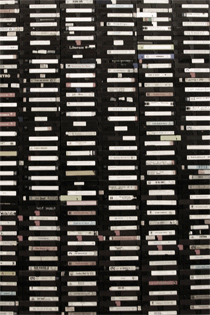Carole Lanoix et Véronique Mauron | 15.12.2015
How can one represent time without resorting to animation ? Still images have inhabited cartography for a long time and it is only recently that the trend has changed in favour of dynamic representations. In the light of this development, we propose to revisit the use of a succession of still images to represent time. Continuing the research entitled Cosmographies, conducted at the Chôros laboratory (Swiss Federal Institute of Technology Lausanne, EPFL), we interrogate the techniques, tools and fictions [...]
Opérativité du cinéma documentaire dans les films de Marc Isaacs et de Henri-François Imbert.
Sébastien Fevry | 08.12.2015
This paper examines how documentary cinema portrays the situation of refugees who are stranded in Calais. More precisely, its purpose is to show that one of the creative possibilities of documentary film consists in transforming a “non-lieu” such as the Sangatte camp into a “lieu d’entre-mémoire” that interconnects recollections and testimonies that belong to different temporal strata. To go further, this article develops a compared analysis between Marc Isaacs’ documentary Calais: The Last Border (2003) and Henri-François Imbert’s film [...]
Jeux de miroirs autour d’un laboratoire de biologie.
Charlotte Brives | 08.12.2015
Alors que l’anthropologie s’est constituée, dans les premiers temps de sa genèse, autour d’un discours sur l’Autre lointain et ses pratiques et croyances, ses objets et méthodes ont constamment évolué. Aujourd’hui, il n’existe pas de domaine réservé sur lequel l’anthropologue ne pourrait pas travailler, enquêter, explorer. Les sciences occidentales, qui ont pendant longtemps été construites dans les écrits des anthropologues comme le référent absolu à l’aune duquel évaluer les cultures non occidentales, sont à leur tour devenues, dans les [...]
Emmanuel Lozerand (dir.). 2014. Drôles d’individus. De la singularité individuelle dans le Reste-du-monde. Paris : Klincksieck.
Gérard Martial Amougou | 01.12.2015
Si la question de l’individualisation reste largement à écrire au sein des sociétés occidentales, le traitement de l’individualité dans le Reste-du-monde semble davantage pressant. L’ouvrage collectif dirigé par Emmanuel Lozerand esquisse un panorama des conceptions plurielles de l’individu ailleurs, que la présente contribution se propose de rendre intelligible tout en explorant quelques perspectives. [...]
Jacques Lévy | 01.12.2015
This Traversal marks the official opening of a scientific partnership between EspacesTemps.net and the PostCarWorld interdisciplinary research project, funded by the Swiss National Science Foundation (2014-2016). As one can notice by browsing the contents of the already-published articles in this series, some papers were released before the start of the project, sometimes by authors that [...]
Sonia Dheur et Hervé Rakoto Ramiarantsoa | 17.11.2015
Forte de ses avancées techniques récentes et mettant en avant son souci de la santé individuelle humaine, la génétique ne s’est jamais autant intéressée à la relation entre l’apparence physique ou le comportement et la singularité génétique. Dans une approche interdisciplinaire critique et réflexive de l’écriture de l’histoire du métissage à Madagascar par la génétique des populations, nous confrontons l’ordre biologique à l’ordre social, en replaçant les recherches récentes dans la réalité sociale malgache. En abordant la question des [...]
Larrère, Catherine et Raphaël Larrère. 2015. Penser et agir avec la nature. Une enquête philosophique. Paris : La Découverte.
Alexandra Borsari | 10.11.2015
Penser et agir avec la nature consists in the last development of Catherine and Raphaël Larrère’s reflection on the relationship between humankind and nature, and the way we can share the same world. With this book, they call for a new political ecology, rebuilt thanks to the core concept of “biodiversity”. Acting as a synthesis of the path the authors have taken since their reference book, Du bon usage de la nature (1997), this work insists on the importance [...]
Sébastien Munafò | 10.11.2015
The thought that information and communications technology can lead to reducing spatial heterogeneity and therefore mobility demand is recurrent. It goes hand in hand with any major technological advance in this field. Faced with this attractive idea, scientists are sometimes invited to highlight empirical evidences that are much more counter-intuitive. [...]
Christian Grataloup | 29.10.2015
Faire renaître le Musée de l’Homme, à Paris, a été une décision politique et épistémologique. Le choix d’assumer le passé de l’anthropologie dialogue avec les perspectives de la mondialisation. L’esplanade des droits de l’Homme est devenue un bon endroit pour dépasser le dilemme nature/société. [...]
Du milieu à l’instrument et au modèle.
Adrien Gey | 12.10.2015
This paper tries to understand and describe the place that nature occupies in sustainable city projects, and compare it with classical planning theory. We’ll see how natural elements have been constituted as a mechanical “environment”, that is to say as a frame influencing users, and a tool by prospective planning, before being considered a “model” by the green urbanism that took place in the “Grand Paris” consultation of 2009. [...]


